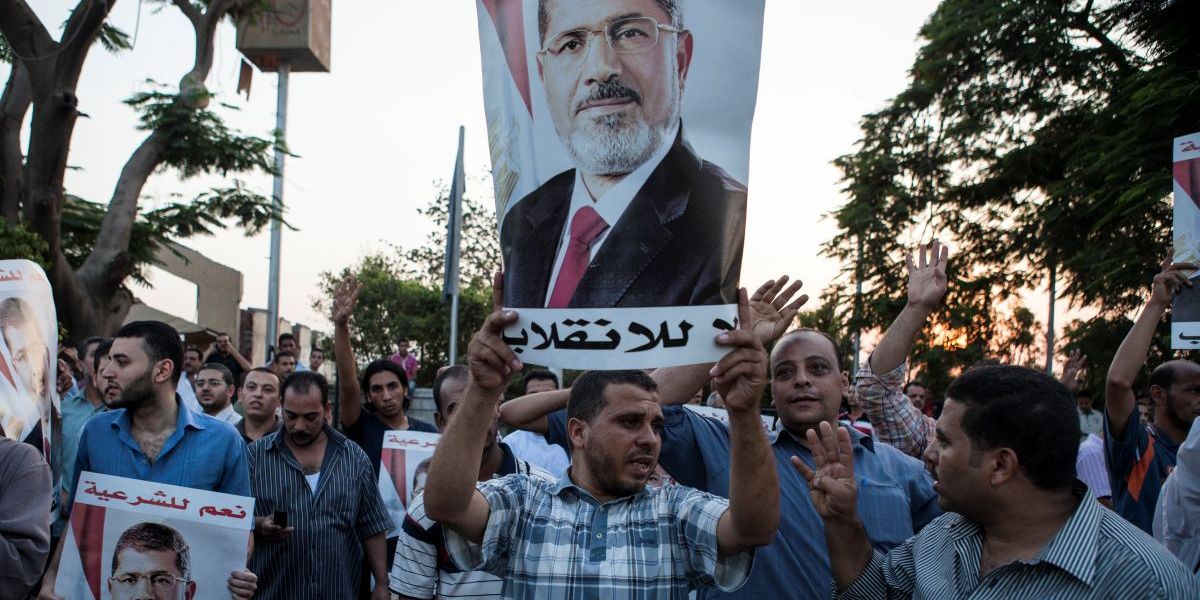Loading player
On July 3, 2013, Mohamed Morsi, then president of Egypt, was deposed in a coup d’état carried out by the army led by Abdel Fattah al Sisi, the current president, who was then defense minister and head of the Egyptian armed forces. Morsi’s presidency lasted only a year but was characterized by strong mass protests against his government due to the deterioration of security and the economic conditions in which the country was located, and the fear of an authoritarian and Islamist drift.
Morsi was the first and only Egyptian president to be elected through democratic elections, favored by the so-called Arab Spring which took place between 2010 and 2011 in various Middle Eastern countries. The Arab Spring consisted of a series of protests that began in Tunisia and then spread to other Arab countries against corruption, the lack of freedom of individual rights and the violation of human rights by regimes. Protests also occurred in Egypt and were such as to force President Hosni Mubarak to resign after thirty years in power, in 2011.
After growing up in Egypt and studying and working as an engineer in the United States, Morsi was a member of the Egyptian parliament from 2000 to 2005. He was part of the Muslim Brotherhood, a radical Islamic movement founded in 1928 in Egypt, very influential in Arab countries and considered a terrorist organization in some countries. During Mubarak’s government, the movement was considered an underground formation, and for its membership Morsi was arrested and imprisoned in 2011.
He managed to escape and, following Mubarak’s resignation, in 2012 he stood as a candidate in the presidential elections with the Freedom and Justice party, the political arm of the Muslim Brotherhood: he won the runoff against the former prime minister and former air force commander Ahmed Shafiq. His victory was significant because for many Egyptians it represented a definitive break with Mubarak’s many years of autocratic rule.
His election was immediately divisive: many Egyptians considered his victory as the culmination of the Arab Spring revolt and hoped for a definitive break with the past, and the Muslim Brotherhood saw it as an opportunity to reassert itself, after years of being considered an underground group. Others, however, feared that a Muslim Brotherhood president might impose strict Islamic moral codes, or even seek to establish a theocratic government.
In the first phase of his government, Morsi showed himself to be moderate in domestic politics, and also in foreign policy he was able to open channels of dialogue with the United States and sought détente with Israel: in October 2012, Morsi intervened as mediator between Israel and Hamas, a group armed radical Palestinian who de facto rules the Gaza Strip, and managed to arrange a truce between the two sides.
Despite the premises, his government was soon accused of excluding the opposition from managing the state with its own policies, and of not being able to administer the country’s economy. One decision in particular caused violent protests. In November 2012, Morsi issued a decree that granted the president greater powers, especially in the judicial sphere: the provision established that the judiciary would not have the power to question the president’s decisions. The aim was to make his presidential decrees non-challengeable and to avoid possible slowdowns in the activity of the constituent assembly that he had charged with drafting a new constitution.
Opponents argued that the president was taking an authoritarian drift like Mubarak’s, and that the new rules could allow Islamists to have greater control over the country, imposing strict Islamic practices and leaving other parties a marginal role in Egyptian politics. The fear was that a constitution heavily influenced by the Muslim Brotherhood – who had dictated the guidelines and conditioned most of the articles – would have an Islamist imprint inspired by sharia, Islamic law, which would go against the more secular and liberal positions.
The protests reached their climax in June 2013. Thousands of Egyptians demonstrated to protest against the government and to demand the resignation of Morsi or early elections. The military led by al Sisi took the side of the demonstrators and in a few days deposed Morsi in a coup d’état. With a group of religious leaders, military leaders and members of the opposition to Sisi, he announced on television that on the initiative of the army the country’s constitution had been suspended and that the head of the Constitutional Court would form a caretaker government.
Morsi was arrested and charged with various crimes, from espionage to breaking out of prison to inciting violence, and for years he was a defendant in a tortuous trial in which he was convicted multiple times. Along with him, many other members of the Muslim Brotherhood suffered harsh repression: a few weeks after Morsi’s deposition, the Egyptian security forces killed more than 800 protesters, mostly belonging to the Muslim Brotherhood. In 2013, the interim government declared the Muslim Brotherhood a terrorist organization and arrested and sentenced hundreds of its members and sympathizers to death.
Morsi died following a heart attack on June 17, 2019 during a hearing in a trial in which he was accused of corruption and treason against the state.
